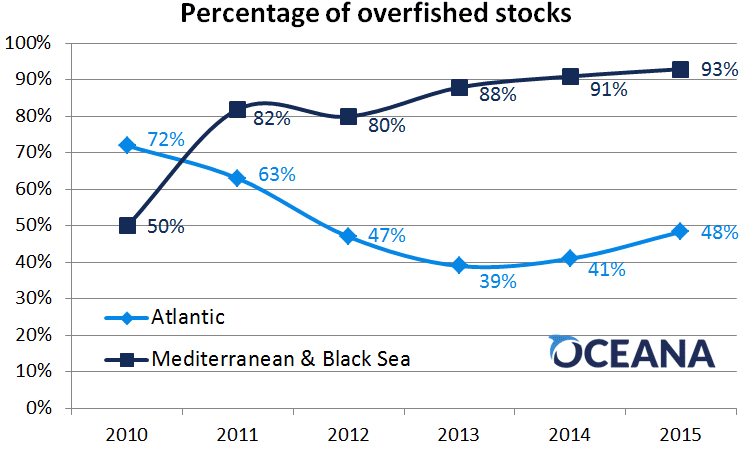Oceana: Regrettable status of fish stocks conflicts with political commitments
Press Release Date: June 2, 2015
Location: Madrid
Contact:
Marta Madina | email: mmadina@oceana.org | tel.: Marta Madina
The list of overfished stocks includes key commercial species such as cod and sole in the Atlantic and hake or swordfish in the Mediterranean
Today, the European Commission has published its annual report on fishing opportunities. It shows a deteriorating trend in the statuses of both Atlantic and Mediterranean stocks. Oceana assesses the situation described by the Commission as disturbing due to serious overfishing and appeals to the Commission and Member States to take firm actions to ensure fishing opportunities adhere to the principles agreed in the Common Fisheries Policy.
The figures presented by the Commission are worrying. Although, in the Atlantic, despite an increase in the number of stocks exploited at maximum sustainable yield levels, the percentage of stocks known to be overfished has increased during last two years, from 39% in 2013, to 41% in 2014, and 48% in 2015. In the Mediterranean, the picture is dismal with 93% of the stocks overfished – a figure that has continued to grow over the last decade. Overfishing has disastrous effects to key commercial species such as cod or sole in the Atlantic and hake or swordfish in the Mediterranean.
“The European Union seems to be making progress in recovering its fish stocks, since the number of fisheries exploited in accordance with MSY is progressively rising. However, citizens should not forget we have just emerged from a bleak period of fisheries management, and major improvements and strong commitments are still needed to achieve healthy European fisheries by 2020. Nearly half of Atlantic stocks, and almost all Mediterranean stocks, are known to be overfished. EU Member States should understand that what is needed to eradicate overfishing is strong, immediate action, and not just moderate progress”, states Lasse Gustavsson, Executive Director of Oceana in Europe.

The situation presented in the report conflicts with the principles and objectives agreed in the reformed Common Fisheries Policy, in particular, the commitment to end overfishing by 2015 where possible. To fix this situation the European Commission’s report proposes a set of principles for fishing opportunities in 2016. The principles are largely concerned with the definition of fishing rates compatible with the Maximum Sustainable Yield and implementation of the progressive discard ban, which for first time will affect a reduced group of demersal and benthic species, which however, remain poorly defined.
“The management of fishing activities in Europe has all the necessary elements, including a scientific basis and policy commitments, to move forward in the successful recovery and responsible exploitation of fish stocks. Achieving this necessary goal or not, depends solely on the political will”, concludes Ricardo Aguilar, Research Director of Oceana in Europe.

